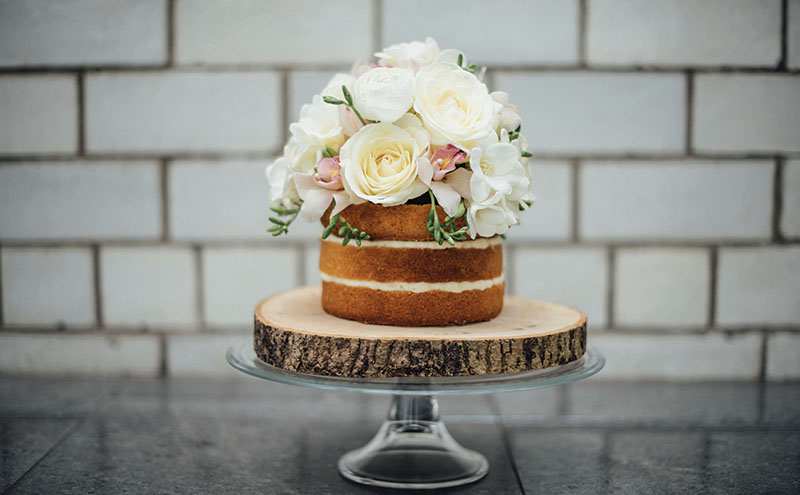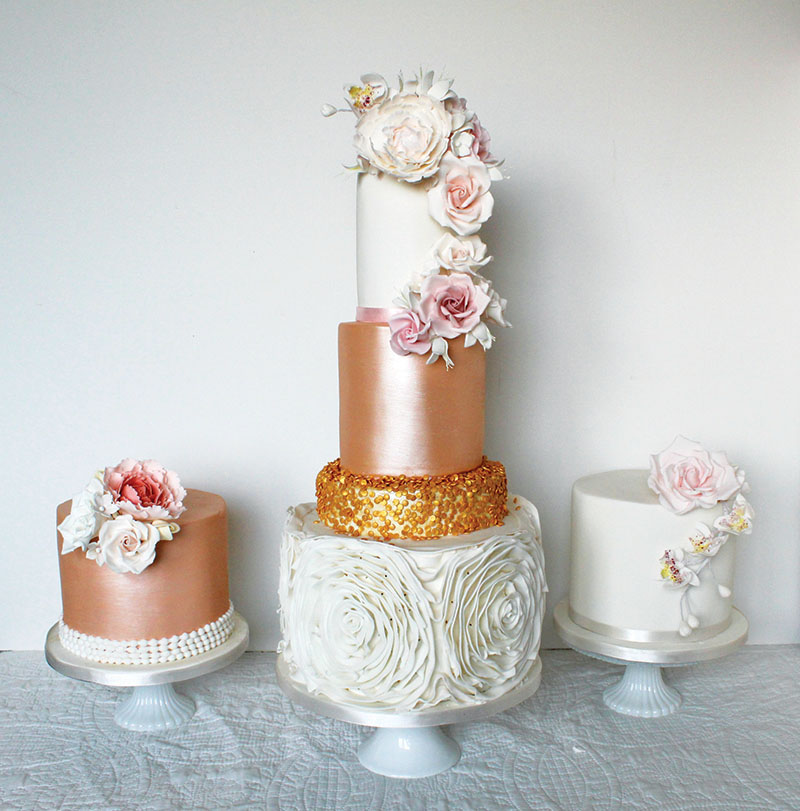Don’t let allergies or intolerances get in the way of the traditional three-tiered bake – you can still have your cake and eat it

Sugar-free, gluten-free, carb-free, fat-free – with so many rules and restrictions floating around, feeling anything close to ‘free’ when it comes to food these days seems impossible. Of course, some of us have no option but to avoid certain foods (hello, allergy sufferers). So how should you approach the calorific minefield of dairy, wheat and sugar that is your wedding cake?
Step one: determine who needs special consideration for their diet. Is it you? Is it several people, all with different issues? “Don’t try combining everyone’s dietary requirements into one recipe unless there’s absolutely no alternative,” cautions Claire Davidson of Liggy’s Cake Company, which has branches in Glasgow and Edinburgh. “We would suggest having one small tier of cake for each requirement. Or we’d make individual cupcakes or mini cakes personalised with names if there are just a few guests with unique dietary needs.”
Tackle the problem in the same way you might treat a difference of taste. Multiple tiers can become a saving grace. “If certain guests need to have a special piece of cake, one or two tiers can be made differently to the rest – gluten-free, for example,” suggests Michael Skene at Baked by Mike.
If you’re working with an intolerance or boycotting a type of food, align your expectations with reality and respect the fact that your cake will be more challenging to whip up than the average sponge-and-buttercream affair. “It’s really difficult to cater for food allergies when 99% of your produce contains gluten, dairy, eggs and so on,” admits cake designer Suzanne Esper.
![[Above] Fig and Rose’s vegan chai tea-spiced loaf with coconut sugared plums, maple and cinnamon glaze and crushed pistachios and [Right] carrot cake layered and iced with vanilla and maple buttercream (instagram.com/_figandrose)](https://tietheknot.scot/wp-content/uploads/2016/10/fig-and-rose-IMG_20160905_130731.jpg)
![[Above] Fig and Rose’s vegan chai tea-spiced loaf with coconut sugared plums, maple and cinnamon glaze and crushed pistachios and [Right] carrot cake layered and iced with vanilla and maple buttercream (instagram.com/_figandrose)](https://tietheknot.scot/wp-content/uploads/2016/10/fig-and-rose-IMG_20160905_130731.jpg)
Firstly, prepare yourself for brutal honesty and, in some cases, a polite refusal from your chosen cake designer if they feel they cannot meet your needs. Health and safety is paramount. Regardless of how much you admire and pine after their work, if polishing it off means a trip to casualty before your first dance, it’s not worth the hassle. “Because our cakes are made in a kitchen which at some point has handled all of the allergens, we have to make our customers aware that there may be traces present,” explains Edwina McNulty, who runs Rosewood Cakes.
As Suzanne also points out, this is particularly important if you have a serious nut allergy. “I don’t offer nut-free cakes because every week we produce batches upon batches of macarons,” she says. “Although everything is scrupulously cleaned, there is always a risk of cross-contamination.”
Don’t feel that asking for an ingredient list is being too pushy: peace of mind takes priority. Most makers will be happy to oblige. “We never disclose our recipes at Rosewood Cakes unless customers have severe allergies,” says Edwina. “We recently had a cake due where the client had numerous allergies and, as we place total importance on health and safety, we let the customer have a list of all the ingredients and brands.”
Your cake might have been made minus the usual suspects of flour, eggs and butter, but no one should be able to tell from the outside. “As far as the design or look goes, special dietary requirements do not impact upon the look of any iced cake,” says Michael. “You can have exactly what you want. The only thing you have to be mindful of with a specialist cake is that the range of flavours may be a little more limited.”


“Vegan cakes are our speciality, as everything we bake is vegan-friendly,” says Rachel Kirkpatrick, who just launched Fig & Rose with her sister Amy. “You would be surprised at how simple it is to cater for the vegan diet. Missing out dairy is a big issue, but there are so many alternatives available to use. And our favourite egg replacers are apple sauce and flax seeds. You can also use mashed banana, chia seeds and coconut oil. As for a butter replacement, dairy-free spreads can be found in most supermarkets.”
What if wheat is your nemesis? “After extensive research, we’ve developed some lovely recipes for cakes made without wheat flour,” says Claire. “Our chocolate and vanilla cakes work best and can be combined with syrups and preserves.”
Nut allergies, meanwhile, can be the most dangerous of conditions to work with, but with a positive attitude you won’t find yourself nervously forking through a sponge in search of crumbs of the offending article. “We use nuts a great deal in our recipes but, for the most part, they are for decoration rather than for incorporating into the mixture,” notes Rachel. “Most raw desserts will use nuts, especially cashews, but with sponge mixes, nuts can removed entirely or replaced with an ingredient that would complement the cake.”








